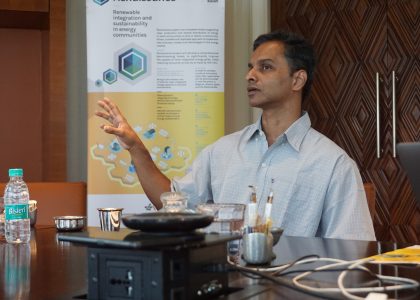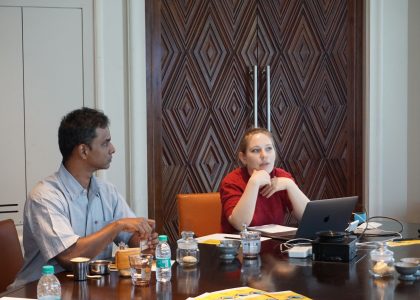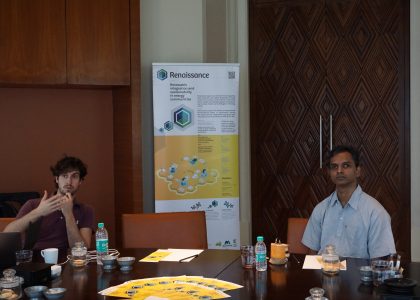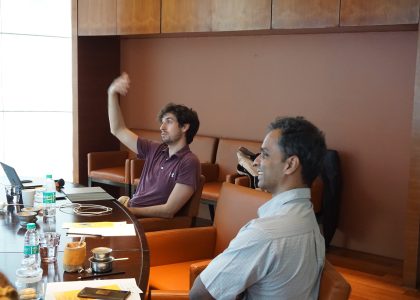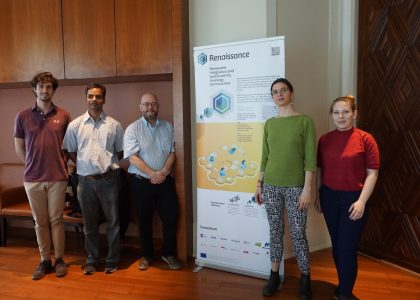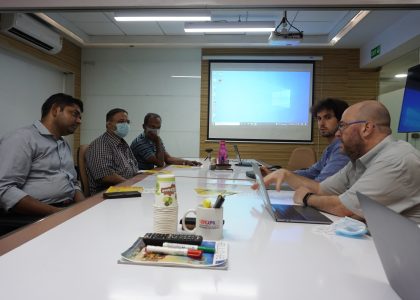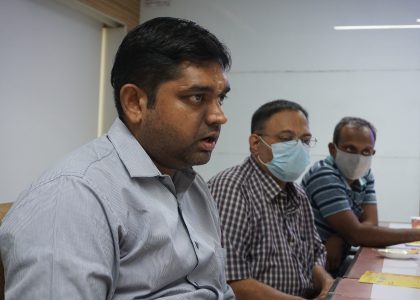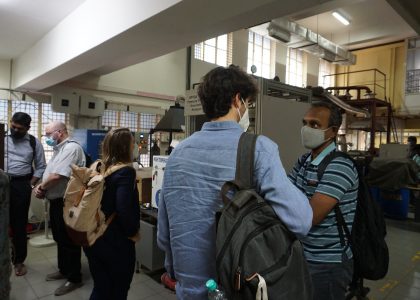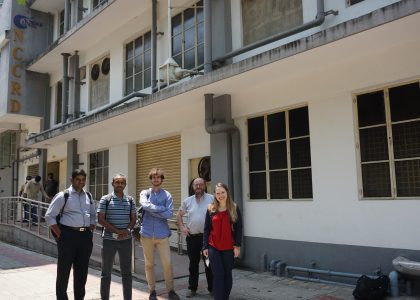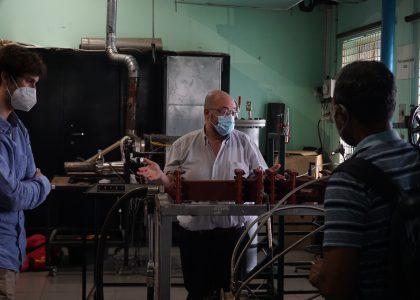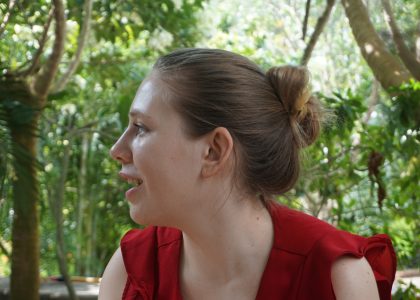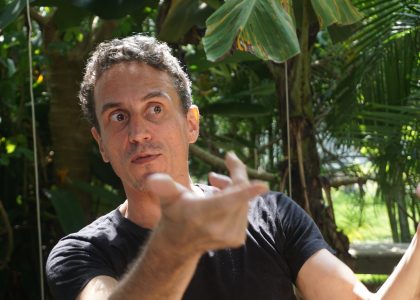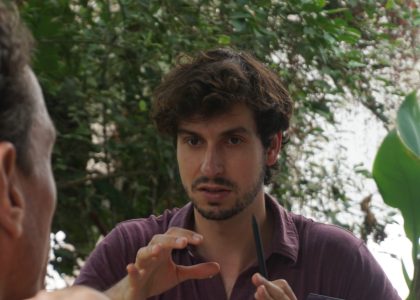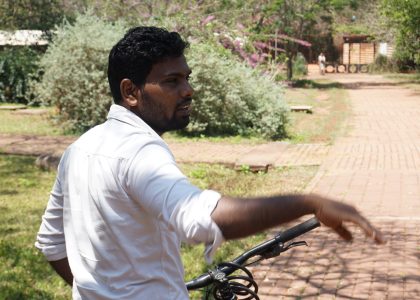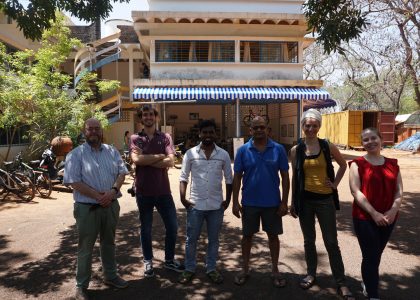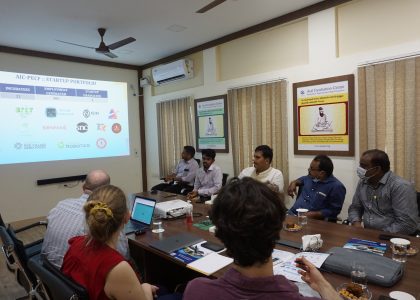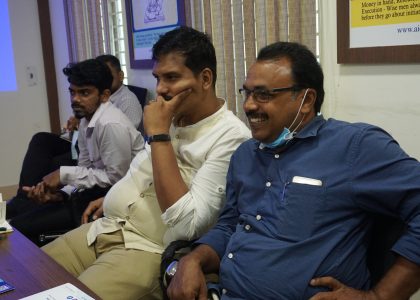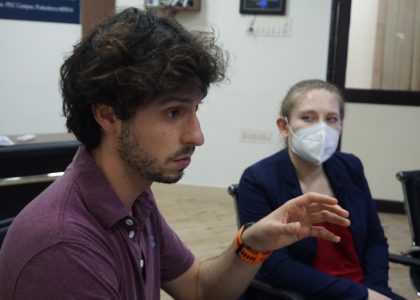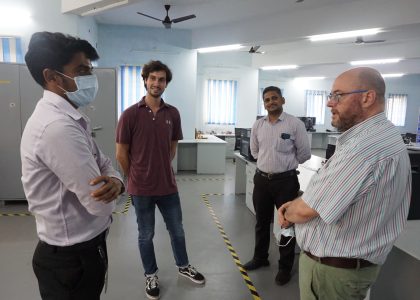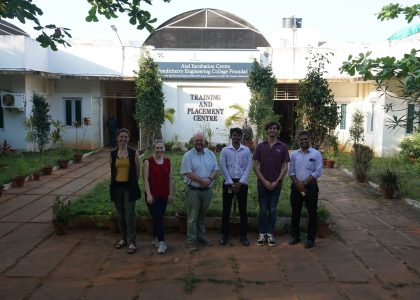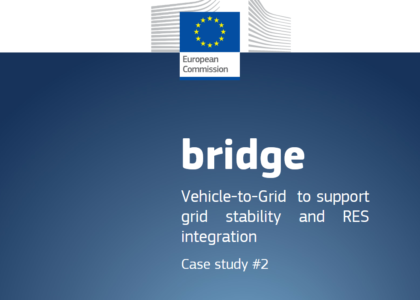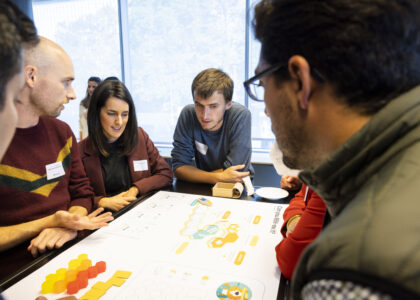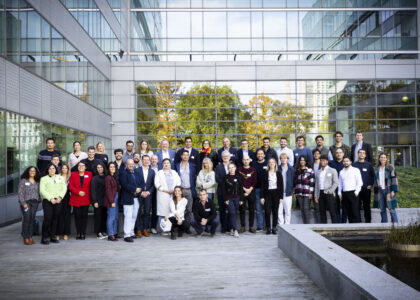by Ander Martinez Alonso, PHD researcher @Vrije Universiteit Brussels
The project replication team is currently running at full steam: the team composed by members of the Consortium from BAX&Company, VUB University and Deep Blue contacted several International emerging energy communities to test and replicate the RENAISSANCE approach.
Between the 8th and 13th o March the project replication team had several meetings with representatives from Indian civic associations, research institutes and technical universities located in the Tamil Nadu region, in Puducherry and in Auroville. In this article a comprehensive report summarises insights and lessons learnt during our visit, before the MAMCA meeting in Auroville.
Read Auroville workshop report
1. General Aims
- Understanding the context for the potential development of Sustainable Energy Communities in India in general – and in Tamil Nadu in particular: Social action, Electric system and grid, tariffs, subsidies, deployment of renewables, etc;
- Introducing the Renaissance project to different stakeholders: MAMCA, goals, methodology, Renergize tool, as well as new concepts/terms: the co-creation approach, prosumers, and energy communities. Gathering feedback on Renaissance approach and its relevance in the local context;
- Improving the understanding about Auroville and its sustainable project.
2. Meetings Agenda
| Day | Timing | Organization |
| 08/03/2022 | 10.00 AM – 11:30 AM | CAG – Consumer and civic Action Group (CAG) |
| 08/03/2022 | 11.45 AM – 12:30 PM | NITT – National Institute of Technology Tiruchirappali |
| 08/03/2022 | 15:00 PM – 16:00 PM | NSEFI – National Solar Energy Federation of India |
| 08/03/2022 | 16:30 PM – 18:00 PM | WRI – World Resource Institute |
| 09/03/2022 | 10.30 AM – 13:30 PM | IITM – Indian Institute of Technology Madras |
| 10/03/2022 | 9:30 AM – 11:00 AM | Fourth Partners |
| 11/03/2022 | 10:00 AM – 14:00 PM | Auroville Consulting + Site Visit |
| 11/03/2022 | 15:00 AM – 17:00 PM | PTI – Pondicherry Technical Institute |
3. CAG – Consumer and civic Action Group in Tamil Nadu
| CAG Attendees | |||
| # | Name | Surname | Organization |
| 1 | Vishnu | Rao | CAG |
The first meeting in Chennai took place in the Park Hyatt Hotel premises, where we met Mr. Vishnu Rao from the Tamil Nadu’s Consumer and Civic Action Group (CAG). The CAG focuses on the protection of civic rights and participation in rural planning, attending the needs of almost 20.000 consumers in Tamil Nadu. Among others, their activities include citizen science, infrastructure renovation (transformers and substations), gender parity, energy efficiency and renewable concepts.
Mr. Rao clarified how in the Tamil Nadu Electric System Generation and distribution are owned and managed by the same owner (state owned). In some other states they have been split, but still a certain shared percentage of public ownership remains in both actors. This mechanism acts as a barrier to the further deployment of (distributed) renewables and prevents the reduction of energy consumption, since it paradoxically promotes the increase of power consumption by the end user, without incentivizing the installation of renewables. This is especially important in rural areas, where incentives to promote renewables would make a real difference for consumers in terms of energy resilience and availability. Mr. Rao also addressed specifically the suitability for Panchayat villages in rural India. In contrast to urban and sub-urban municipalities, Panchayat villages are locally, self-governed entities which could decide for renewables more independently. However, the policy in Tamil Nadu is focusing on centralized energy generation, with an increasing penetration of a more reliable grid. The existence of a High Voltage National Transmission system strongly increased the reliability of the grid,
Also, regarding the tariffs, there is a differentiation between High Tension (HT) and Low Tension (LT) consumers and the different tariffs and subsidies applying. LT consumers consuming under 100 units (kwh/year), and people who are unable to bear the power cost are exempted. This also applied for Temples and small enterprises. HT consumers in comparison pay higher bills, based on the principle that the wealthier are paying for the poorer, but in many cases they also receive subsidies which basically wash away the social justice behind it.
Finally, regarding Renewable Energy Project the central government only finances big scale projects (>100MW). The only other major investment envisioned for the Tamil Nadu region is the green energy strategy called the Green Energy Corridor and a few wind power installations (Read more at the official Indian Ministry of Power website).
Mr. Rao was very interested in the Renaissance approach and its customer and stakeholder engagement overall strategy and the MAMCA tool. In particular, CAG has shown high interest on how to align the interest of stakeholders in large communities. Also, they are interested on using the Renergise tool in some case studies such as schools going solar and village energy plans. A beta version of the Renergise tool will be sent to Mr. Rao for validation and assessment.
4. NITT – National Institute of Technology in Tiruchiappali
| NITT Attendees | |||
| # | Name | Surname | Organization |
| 1 | Vivek | Mohan | NITT |
Professor Vivek Mohan from the National Institute of Technology leads a group of six PhD candidates working on energy management of microgrids and optimization of energy systems. Overall, they are interested mainly in the Renergise tool and in the modelling of the pilot sites’ energy scenarios. Concerning the MAMCA decision making process, they acknowledge its relevance in deal with the conflictive objective of the different stakeholders..
The conversation evolved towards an exchange on the technicalities of the different approaches used by the VUB and NITT to model and assess on energy power systems. Due to NITT potential interest on further collaboration, VUB presented the Green Energy Park Project and the Brussels Pilot as a big scale living lab where energy management algorithms can be tested.
5. NSEFI – National Solar Energy Federation of India
| NITT Attendees | |||
| # | Name | Surname | Organization |
| 1 | Ayush | Shukla | NSEFI |
Mr. Ayush Shukla joined the meeting on behalf of the National Solar Energy Federation of India. The NSEFI is an industrial organization focusing on policy making and on the challenges that faced at a central level by major stakeholders from industry and the government. They have a framework for international collaboration with other countries of Asia and their main interest is on the Renergise tool, on which they will provide feedback as soon as the operating version is available online.
6. WRI – World Resource Institute in Tamil Nadu
| NITT Attendees | |||
| # | Name | Surname | Organization |
| 1 | Sandhya | Sundararagavan | WRI |
| 2 | Sumedha | Malaviya | WRI |
On the third day we met Mrs. Sandhya Sundararagavan and Mrs. Sumedha Malaviya, from the World Resources Institute. The international organization has been supporting the different stakeholders – including public administration, industry and academia, involved in the sustainable development of Tamil Nadu towards a shared pathway to carbon neutrality. In urban areas, they achieve this mainly by focusing on energy efficiency strategies, exploring new technologies and looking at future energetic scenarios. Meanwhile, in rural areas, they work hand in hand with agro-industrial partners analysing the potential supply and the existing energy demands to enable distributed renewable energy generation. MAMCA was considered an innovative approach and especially suitable for bottom-up initiatives emerging in the outskirts of bigger cities, such as at Bangalore. The representatives highlighted that, approaches such as MAMCA, are currently investigated/tested in India but that the deployment is at a very early stage.
They support a multiplicity of stakeholders along the whole process: implementation, potential energy sharing uptake analysis, support on tariff fractionalization and future energy scenarios.
Currently they achieve this with their own tools that, similarly to the Renergise tool, allow them a preliminary sizing of capacities, assessing the potential of distributed renewable generation, in terms of energy supply and ROI. They are willing to benchmark their experience with the Renergise tool.
7. IITM – Indian Institute of Technology Chennai/Madras
| IITM Attendees | |||
| # | Name | Surname | Organization |
| 1 | Prof. T. M. | Muruganandam | IITM |
| 2 | Dr. R. | Vinu | IITM |
On the fifth day there was a morning meeting with the Indian Institute of Technology Madras in Chennai. The IITM is one of the Indian Government fostered excellency centers. They have more than 30 technical departments distributed among many different buildings of their campus. They are aiming at a new grant for optimal models and designs in Microgrids. They also have an ongoing project in gasification, covering Hydrogen and indirect gasification of biomass and methanol, with their own designed biomass reactor, suitable for a multitudes of waste and deployable in rural areas with limited investment capabilities.
They want to develop a campus microgrid and the approach of Renaissance and the methodology and tools seems relevant for them. In particular, identifying most feasible scenarios and compare different options with the Renergise tool, could be the initial step towards this goal. Also here the Renergise tool will be given for benchmarking purposes, and as a string point for potential collaboration.
8. Fourth Partners in Tamil Nadu
| NITT Attendees | |||
| # | Name | Surname | Organization |
| 1 | Vinayak | Kathare | Fourth Partners |
In the afternoon the team met Mr. Vinayak Dattatraya from Fourth Partners in an online meeting. The company develops solar projects and farms for larger consumers. Installing PV generates profit for this large consumers with respect to auto-consumption and security of supply. They are also targeting the implementation of charging infrastructure for EVs with a focus on two-wheelers.
10. AC – Auroville Consulting
| # | Name | Surname | Organization |
| 1 | Veeramani | Viswakedhu | AC |
| 2 | Martin | Scherfler | AC |
On our sixth day we had a preliminary meeting with the Auroville Consulting to share the results of the simulations and the different scenarios that would proposed during the MAMCA workshop. Auroville Consulting has been providing data and support during the whole process in the last few months and this exchange allowed aligning expectations and objectives.
The main points discussed were focused on:
- Increasing our understanding on blackouts and how the assets are connected and performing depending on the grid availability.
- increasing the comprehensibility of scenarios and enrich the overview of what has been considered for the modelling, especially for the reference scenario.
- Receive updates about recently added buildings and about the future plans to add 200 kWh of batteries. As a consequence, the grid will have to change accordingly to accommodate higher demand and storage capacity.
Additionally, following up to the conversation with Fourth Partners, targets on mobility in Auroville were discussed: the target is to reach 60% of electrified 2-wheelers and 3-wheelers and 50% of electrified 4-wheelers vehicles by 2030. The team ended the visit with a e-bike site tour, getting to know all the sustainable local projects and the installations of the pilot site.
10. PTU – Pondicherry Technical University
| # | Name | Surname | Organization |
| 1 | Dhasarathan | ATAL/PTU | |
| 2 | Bhavanesh | ATAL/PTU |
On the same day, after lunch, the team visited the ATAL – Incubation center, which has a collaboration framework with Auroville Consulting. ATAL is a research center linked to the Pondicherry Technical University focusing on technologic start-ups: fabrication, prototyping, drones, mobility, etc.
Mr. R. Dhasarathan and Mr. Bhavanesh are the leaders of the Sustainable Energy Portfolio, focusing on gasification, biomass and solar power on remote locations. They have access to many pilot sites to test their solutions and collect data. The Renergise tool will be send to them for assessment.
PTU wants to develop a microgrid on campus, equipped with 1 MW of Solar rooftop panels, and 1 MW of ground solar panels. They want to resubmit a proposal on the project and would be interested on international collaboration
Conclusions
Main conclusion is that the Tamil Nadu region is mainly focused on a centralized system, and the deployment of energy communities is not a priority yet, although for some rural area it still would be a benefit due to poor distribution network and infrastructures. There was an interest in the Renaissance methodology, but with a focus on the Renergise tool.
Follow us:
